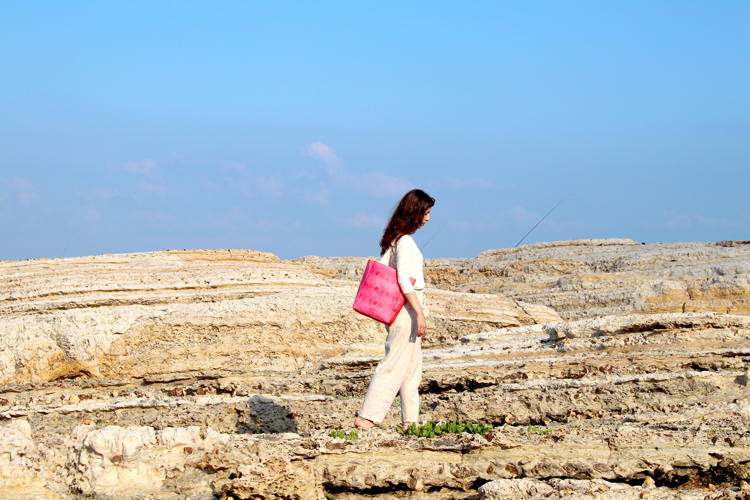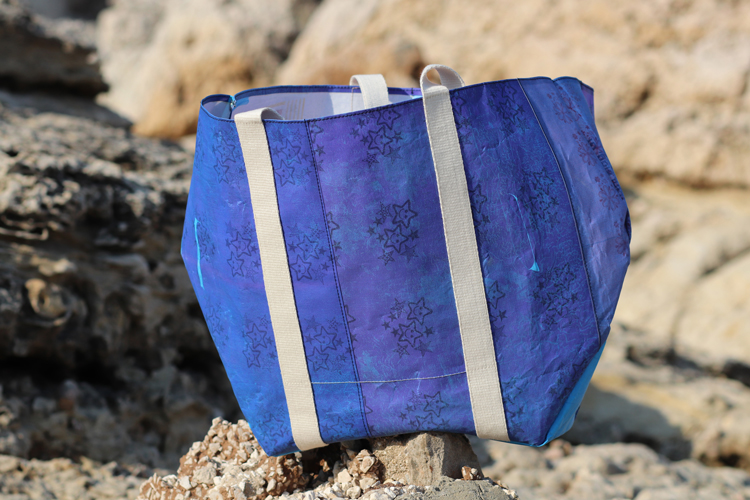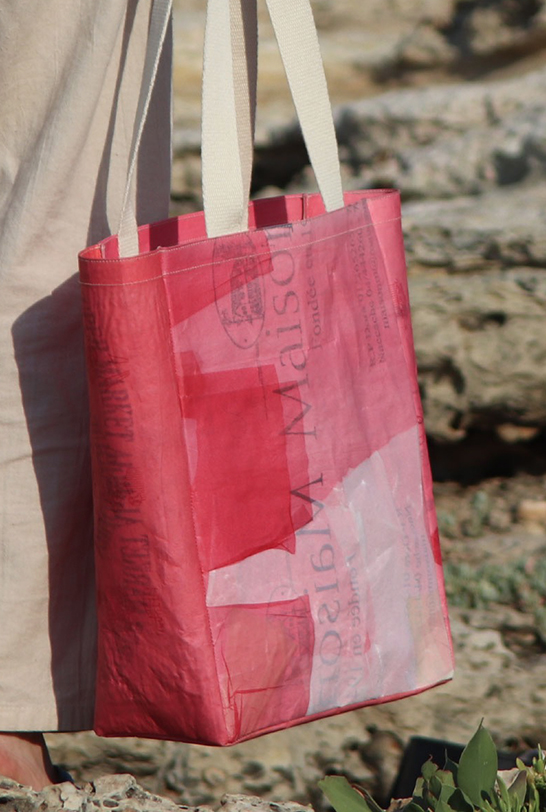Nour Kays takes discarded plastic bags and makes them into something special through her unique designs. Sitting down to talk with the Fashion Designer, she talks through her creations in more details and lets us in on her plans for the future.
Nour Kays is on a mission to change the perception of recycled fashion. The Lebanese based designer takes unwanted plastic bags and develops them into one of a kind handbags. Kays has long had an issue with discarded bags, especially in her home town of Beirut which suffered the garbage crisis in 2015.
This resulted in a line of products that are locally produced, water-resistant, light, durable and made of waste. NK complies with slow fashion norms, working ethically with local artisans and the brand aims to have a zero waste production. Here we discover the woman behind the brand and why it means so much to her to be able to initiate this project.
A&E Interviews Fashion Designer Nour Kays
What inspired you to use plastic bags for your designs?
The project started as a final project for my MA in London at Kingston University (in Communication Design). I wanted to use waste and transform it into something new. I thought that using raw material would be a waste of material, as we consume and waste so much in our daily lives, especially plastic items which take years to decompose. I looked around and found that I had piled up many plastic bags under my sink, so I began experimenting with them. Why Plastic Bags? Because at that time in London, they were still given out for free, and very easy to pile up. The awareness around plastic bag waste was not as big as it is now.
Tell us about the production of the bags?
The process begins by collecting unwanted plastic bags. We started by collecting them from family and friends, and then with the help of social media, the circle grew wider, and we currently place bins within businesses to collect them. The bags are then washed and prepared by cleaning them with a sponge and water. Next, we cut them to flatten them and then we sort them by colour to make it easier to assemble sets of bags together.
Once we place a few bags together, we assemble different bags together making different colour combinations and then we send them to the technician who presses them into flat sheets. Next, we cut them according to the patterns, into various simple shapes, add any additional items we need and send them to our tailor, who then sews them into our line of products. This results in many leftover trims from the cuts, that we collect in order to reintroduce in our production process, to create new items.
What challenges do you face in the process?
With our production process, it is almost impossible to replicate the same sheet twice, as colours vary from one plastic bag to another and the composition varies. Which makes it hard to provide customers with the same design twice. We cannot reproduce an item, we can do something similar but not the exact same. This means each bag is completely unique.
How do you ensure you don’t run out of plastic bags?
Although we have never experienced shortages in raw materials so far, if needed due to increased demand, we could collect additional bags from waste collectors in the city, who are ready to supply us for free with sorted used plastic bags.
Would you consider expanding your line to use other recyclable materials?
More and more we are seeing countries implementing plastic bag bans, and even though Lebanon seems to be far behind on anything environmentally-friendly, we have to expect it to happen there one day too. This is why, since the beginning of our project, we mentioned that we aim to move to other “waste” materials in the next phase. For us, at NK it is just the beginning of the journey, and there is still a lot more to do and dream about, but we are confident that the opportunities are endless.
In the next couple of years, we aim to be a completely sustainable brand, making sure all the items we use are consciously chosen, and for that, we need to research in the market and try to find better alternatives for some materials we are currently using.
What is the life expectancy of your bags?
We have been operating for almost five years now and we have people who are still wearing the items they bought from us at the beginning. However, with time the plastic does get softer, and changes in texture.
We keep improving our production process, making the material sturdier. We follow circular economy principles, by constantly rethinking the whole lifecycle of our products. Never wasting any trims from our material, and always finding new ways to reintegrate them in our production process, whether it is to make smaller items, or to fill our cushion cases.
How do customers react to your bags?
A lot of people are shocked that they are made of plastic bags. People usually like them because of their aesthetic appearance and sustainability is an added layer. I also have people who come to me simply because it is a repurposed product and they want to support the cause.
Sustainability today is of great importance. How does that affect your brand?
I started my brand before the garbage crisis in Beirut. And I have noticed a shift in peoples perspectives, an awareness, and curiosity. People on individual levels want to take action, and make changes. There are a lot of private sector companies and eco-friendly brands that have popped up in the past few years. And it became a sort of hub in Beirut, where all the “sustainable” brands know one another and support each other.
This has brought opportunities, to make events themed for sustainable lifestyles. The first event was when Beirut Design Week in 2016, which had a Sustainable theme and then many events followed. Beach cleanups were made, a sustainable hub was created by Joslin Kehdy, founder of Recycle Lebanon, and she recently opened the first “eco-souk” in Beirut, which I am part of.
What is the goal you want to achieve with your brand?
Our mission is to make conscious wear look cool and effortless by reducing the amount of plastic bags ending up in nature and repurposing them creatively into new high-quality products; giving plastic bags a new life.
As kids, my twin sister and I would spend a lot of time in the mountains around nature and we would eat from the plants and trees that our grandpa had planted. We would play with sand and mud, climb trees, go on hikes, walk along the rivers, and play with animals and insects. I think this shaped me into the person that I am today and the reason why I respect nature. I did not decide to be a green entrepreneur, it just happened, there was an issue that I considered a problem and that was plastic bags, so I found a solution to divert it from ending up in nature and polluting it.
What future projects are you working on?
Our products have been mostly basic items. We are not following trends, and our products are mostly functional, designed in the most simple shape; usually flat shapes, using the least material possible to produce while keeping them functional, durable, and aesthetically pleasing. Our line of products is still fairly small, and thus we do plan to expand in many ways.
We plan to expand product design, by designing our own line of packing boxes, and cushions (we are currently prototyping these designs). We also plan to expand our line of bags and pouches, by adding new designs. Additionally, we have experimented with fashion items, such as sandals, and coats. We experimented with the material and we came up with many new ways of using the material.
Do you think that the steps you are taking may contribute positively to the environmental reality that the world is experiencing today?
Yes, but in a very small percentage. Since we started operating we have managed to divert approximately 10,960 plastic bags from ending up in landfills, nature, and the ocean. We have managed to prolong the life span of those used plastic bags. Since plastic bags are not fully recyclable yet, one of the solutions is to repurpose the plastic bags into new usable materials; give them a new life and divert them from nature for as long as possible.
What would you still like to achieve?
On a business and brand level, I hope that it will grow into becoming a full-time job as I am still doing it as a hobby. The social value of the project begins by involving the community, by asking them to provide us with the raw materials. We are raising awareness whilst making use of their waste. We are also providing ad hoc work to local artisans, and hopefully green job opportunities to the local market in the future.
What criticisms do you get regarding the project?
The value for money. Some people assume that since its made of “waste” it should be cheap. but they don’t take into account the process the “waste” material went through to transform into this new product. And the fact that we are working at a craftsman level, and we value the people we work with. We are all about slow fashion, and producing in small batches.
We implement incremental growth which allows each individual artisan, to progress at a rate of production that is in harmony with their own personal lives.
What would be your advice to anyone who wants to take a step towards sustainability and thinks it is simple?
As individuals, we have a very strong power to change. We can change our behaviour in our daily life with very simple actions like saying no to plastic straws or taking tote bags with us to supermarkets instead of using plastic bags. By refusing, reducing and reusing items, we are helping the environment and choosing a sustainable lifestyle.
I always tell the people who supply me with their plastic bag waste to reduce their consumption. Being aware of what we are consuming and where it ends up is key. As we usually think that once we throw something it simply goes away.
What is the motto you live by?
To constantly grow, question yourself, and change.
READ MORE
Lebanese Designer Roni Helou Talks Winning the Fashion Trust Arabia Award and
Going Global
High-End Fashion Brands Making Steps Towards Sustainability
Maria Tash on Expanding her Jewellery Brand into the Middle East and Her Most Sentimental Item



















